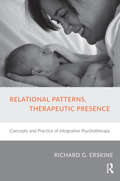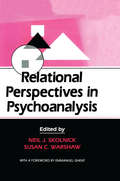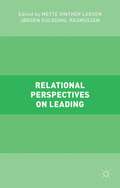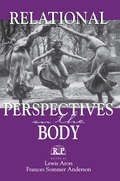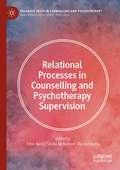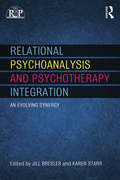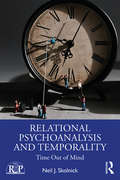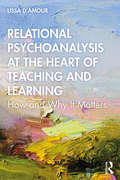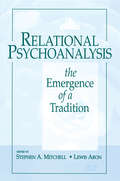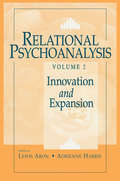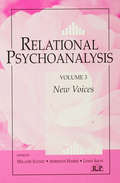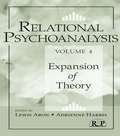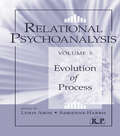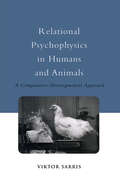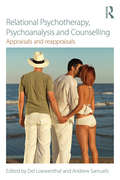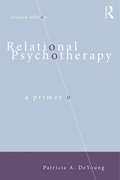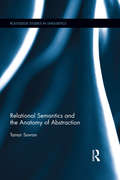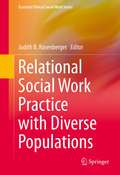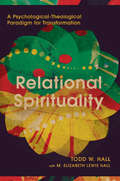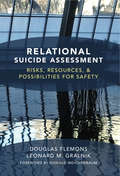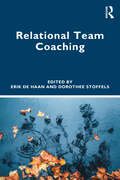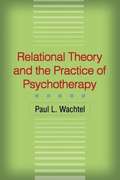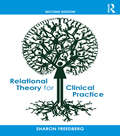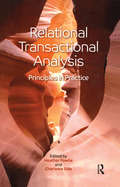- Table View
- List View
Relational Patterns, Therapeutic Presence: Concepts and Practice of Integrative Psychotherapy
by Richard G. ErskineThe introduction and the twenty-one chapters in this book reflect the ongoing development and refinement of Relational and Integrative Psychotherapy. Each chapter amalgamates ideas from several theoretical frame works: Client-Centred Therapy, Gestalt Therapy, Transactional Analysis, Contemporary Psychoanalysis, and Psychoanalytic Self-Psychology, as well as inter-subjective and co-creative perspectives.The theory of 'Life Script' serves as a unifying theme to elaborate the concepts of unconscious experience, attachment and relational patterns, the essentialness of contact-in-relationship, and the centrality of relational-needs in the practice of psychotherapy. This book begins with eight philosophical assumptions essential in the practice of a relational psychotherapy. Integrated throughout the chapters is a sensitivity to both normal developmental processes and the psychological compensations that occur when there has been prolonged neglect and psychological trauma. Several case presentations illustrate the use of phenomenological and historical inquiry, developmental and rhythmic attunement, and the importance of therapeutic presence.
Relational Perspectives in Psychoanalysis
by Neil J. Skolnick Susan C. WarshawA watershed in the articulation of the relational psychoanalytic paradigm, this volume offers a rich overview of issues currently being addressed by clinicians and theoreticians writing from a variety of complementary relational viewpoints. Chapter topics cover the roots of the relational orientation in early psychoanalytic thinking, the impact of relational consideration on developmental theory, relational conceptions of "self" and "other," and clinical applications of relational perspectives.
Relational Perspectives on Leading
by Mette Vinther Larsen Jørgen Gulddahl RasmussenRelational Perspectives on Leading discusses leadership from a relational and social constructionism perspective as practiced on an everyday basis between people. The book pursues a fast growing, practice-based approach - particularly within the Anglo-Saxon parts of the world - to organization studies and organizational phenomena. This approach allows more micro-oriented and incremental aspects of organizational practices to be explored. Key concepts explored within this perspective revolve around plurality, emergence, interpretation, communication, meaning, linguistic turn, practice, coincidence, in-situ, co-construction and the ability to construct new ways to move forward in relation with other. The authors analyse these concepts by integrating theory and practice in concrete organizational examples.
Relational Perspectives on the Body (Relational Perspectives Book Series #Vol. 12)
by Lewis Aron Frances Sommer AndersonContemporary psychoanalysis has devoted so much of its attention to relational and interpersonal aspects of psychic life that questions have begun to emerge regarding the place of the body and bodily experience in our psychological worlds. Relational Perspectives on the Body addresses these questions in exemplary fashion. Contemporary relational theorists synthesize a variety of theoretical trends and influences - including feminism and postmodernism - in order to provide innovative relational models of psyche-soma integration. Throughout the book, contributors pay attention to the analysand's and the analyst's experiences as they devise original technical responses to the multifaceted ways in which bodily experiences enter into the relational matrix of psychoanalytic treatment. In the process, contributors take up subjects that are seldom addressed in the clinical literature, including breast cancer in the analyst, psychoanalytic treatment of Munchausen's Syndrome, physical deformity, and musculoskeletal back pain. The final three chapters, by Looker, Balamuth, and Anderson, respectively, grew out of a study group that continues to investigate the relationship between somatic and symbolized experience. The editors are well equipped to undertake this project. Lewis Aron is a leading relational theorist and clinical analyst, and Frances Sommer Anderson has employed a psychoanalytically informed approach to treating musculoskeletal back pain and other somatic symptoms for 18 years. The editors have enlisted original contributions from an excellent group of colleagues, placing Relational Perspectives on the Body at the forefront of the revival of interest in the body and bodily experience in psychoanalytic theory and practice.
Relational Processes in Counselling and Psychotherapy Supervision (Palgrave Texts in Counselling and Psychotherapy)
by Ottar Ness Sheila McNamee Øyvind KvelloThis book is focused on relational processes in supervision for counselling and psychotherapy. The aim is first to introduce a relational theoretical stance, then to apply that stance to the process of supervision, and finally to offer practitioners immediately accessible resources for relational supervision. Within a relational perspective, supervisor and supervisees are viewed as partners who co-construct the supervisory process. Unlike other approaches to supervision where the emphasis is on specific techniques and strategies for supervision, the relational orientation of this book invites supervisor and supervisee into different understandings of the supervisory interaction. This orientation directs our attention to the importance of co-creating the therapeutic relation/alliance with special attention to the wellbeing of the the supervisee and the supervisor. Supervision, from this perspective, is focused on what participants are making together rather than on the individual abilities, strengths, and weaknesses of either the supervisor or the supervisee.
Relational Psychoanalysis and Psychotherapy Integration: An evolving synergy (Relational Perspectives Book Series)
by Jill Bresler Karen E. StarrRelational Psychoanalysis and Psychotherapy Integration traces the history of efforts to integrate psychoanalysis with other psychotherapeutic modalities, beginning with the early analysts, including Ferenczi and Rank, and continuing on to the present day. It explores the potential for integration made possible by contemporary developments in theory and technique that are fundamental to a relational psychoanalytic approach. Editors Jill Bresler and Karen Starr bring together an array of valuable theoretical and clinical contributions by relationally oriented psychoanalysts who identify their work as integrative. The book is organized in four segments: theoretical frameworks of psychotherapy integration; integrating multiple models of psychotherapy into a psychoanalytically informed treatment; working with specific populations; the future of integration, exploring the issues involved in educating clinicians in integrative practice. The contributions in this volume demonstrate that integrating techniques from a variety of psychotherapies outside of psychoanalysis can enrich and enhance psychoanalytic practice. It will be an invaluable resource for all practicing psychoanalysts, psychotherapists, and psychoanalysts and psychotherapists in training, particularly those with an interest in relational psychoanalysis and psychotherapy integration.
Relational Psychoanalysis and Temporality: Time Out of Mind (Relational Perspectives Book Series)
by Neil J. SkolnickIn Relational Psychoanalysis and Temporality, Neil J. Skolnick takes us on a journey that traces his personal evolution from a graduate student through to his career as a relational psychoanalyst. Skolnick uniquely shares his publications and presentations that span his professional career, weaving in issues around temporality and relational psychoanalysis. Accessible and deeply thought-provoking, this book explores the many ways our lives are pervaded and shaped by time, and how it infuses the problems that psychoanalysts work with in the consulting room. Skolnick begins each chapter with an introduction, contextualizing the papers in his own evolution as a relational analyst as well as in the broader evolution of the relational conceit in the psychoanalytic field. Following an incisive description of the realities and mysteries of time, he highlights how psychoanalysts have applied several temporal phenomena to the psychoanalytic process. The papers and presentations address an assortment of time-worn psychoanalytic issues as they have become redefined, reconfigured and re-contextualized by the application of a relational psychoanalytic perspective. It purports to chart the changes in the field and the author’s practice as, like many psychoanalysts, Skolnick explains his shifted perspective from classical to ego psychological, to relational psychoanalysis across the trajectory of his career. Finally, the author struggles to understand the contributions of time to the process of change in psychoanalytic thought and practice. This book also provides a fascinating guide to how our lives are contextualized in the invisibilities of time, illuminating the most frequent ways time influences psychoanalytic thinking and practice. Relational Psychoanalysis and Temporality will be of immense interest to psychoanalysts, psychoanalytic psychotherapists and therapists of all persuasions in their practice and training. It should also be of interest to philosophers, historians and scholars of psychoanalysis who have a general interest in studying the role of psychoanalysis in influencing contemporary trends of Western thought.
Relational Psychoanalysis at the Heart of Teaching and Learning: How and Why it Matters
by Lissa D’AmourThis book introduces the insights of contemporary relational psychoanalysis to educational thought and uses them as the foundation for a comprehensive model for understanding and informing teaching and learning practice. The model integrates what we know about conscious thought, motivation, and the physical body and translates these understandings in ways that are meaningful and relevant to the circumstances of practicing teachers, school leaders, and teachers of teachers. It will be of great interest to them and to those educational scholars whose attentions turn to the exigencies of the current era. Echoing calls for inclusivity, the book stands against admonishing anyone on the right way to be a person. Instead it emphasises understanding and, in understanding, practicing well. Readers will gain a deeper appreciation of the nature of sense-making and awareness and of the practical implications of cognition as embodied, life forms as non-linear dynamic systems, and relationships as core to human development and classroom life. It was Einstein who, in a letter to Freud, once asked for an educational solution to the menace of war. Today’s urgencies – of nations divided, diminishing planetary resources, and certain ecological disasters – press for wisdom beyond our collective habit. Thankfully the once-elusive mysteries of life, mind, learning, and learning systems now yield in ways to help shape answers to Einstein’s question. Relational psychoanalysts, psychotherapists, educational theorists, teachers, and those who work with them will be intrigued by the convergences and heartened at the possibilities.
Relational Psychoanalysis, Volume 14: The Emergence of a Tradition (Relational Perspectives Book Series #14)
by Stephen A. Mitchell Lewis AronOver the course of the past 15 years, there has been a vast sea change in American psychoanalysis. It takes the form of a broad movement away from classical psychoanalytic theorizing grounded in Freud's drive theory toward models of mind and development grounded in object relations concepts. In clinical practice, there has been a corresponding movement away from the classical principles of neutrality, abstinence and anonymity toward an interactive vision of the analytic situation that places the analytic relationship, with its powerful, reciprocal affective currents, in the foreground. These developments have been evident in virtually all schools of psychoanalysis in America, from the most traditional to the most radical. The wellspring of these innovations is the work of a group of psychoanalysts who have struggled to integrate aspects of interpersonal psychoanalysis, various British object relations theories, and psychoanalytic feminism. Although not self-selected as a school, these theorists have generated a distinct tradition of psychoanalytic thought and clinical practice that has become extremely influential within psychoanalysis in the United States. Relational Psychoanalysis: The Emergence of a Tradition brings together for the first time the seminal papers of the major authors within this tradition. Each paper is accompanied by an introduction, in which the editors place it in its historical context, and a new afterward, in which the author suggests subsequent developments in his or her thinking. This book is an invaluable resource for any clinical practitioner, teacher or student of psychoanalysis interested in exploring the exciting developments of recent years.
Relational Psychoanalysis, Volume 2: Innovation and Expansion (Relational Perspectives Book Series)
by Adrienne Harris Lewis AronThe "relational turn" has transformed the field of psychoanalysis, with an impact that cuts across different schools of thought and clinical modalities. In the six years following publication of Volume 1, Relational Psychoanalysis: The Emergence of a Tradition, relational theorizing has continued to develop, expand, and challenge the parameters of clinical discourse. It has been a period of loss, with the passing of Stephen A. Mitchell and Emmanuel Ghent, but also a period of great promise, marked by the burgeoning publication of relational books and journals and the launching of relational training institutes and professional associations. Volume 2, Relational Psychoanalysis: Innovation and Expansion, brings together key papers of the recent past that exemplify the continuing growth and refinement of the relational sensibility. In selecting these papers, Editors Lewis Aron and Adrienne Harris have stressed the shared relational dimension of different psychoanalytic traditions, and they have used such commonalities to structure the best recent contributions to the literature. The topics covered in Volume 2 reflect both the evolution of psychoanalysis and the unique pathways that leading relational writers have been pursuing and in some cases establishing.
Relational Psychoanalysis, Volume 3: New Voices (Relational Perspectives Book Series #34)
by Adrienne Harris Lewis Aron Melanie SuchetRelational psychoanalysis has revivified psychoanalytic discourse by attesting to the analyst's multidimensional subjectivity and then showing how this subjectivity opens to deeper insights about the experience of analysis. Volume 3 of the Relational Psychoanalysis Book Series enlarges this ongoing project in significant ways. Here, leading relational theorists explore the cultural, racial, class-conscious, gendered, and even traumatized anlagen of the self as pathways to clinical understanding. Relational Psychoanalysis: New Voices is especially a forum for new relational voices and new idioms of relational discourse. Established writers, Muriel Dimen, Sue Grand, and Ruth Stein among them, utilize aspects of their own subjectivity to illuminate heretofore neglected dimensions of cultural experience, of trauma, and of clinical stalemate. A host of new voices applies relational thinking to aspects of race, class, and politics as they emerge in the clinical situation. The contributors to Relational Psychoanalysis: New Voices are boldly unconventional – in their topics, in their modes of discourse, and in their innovative and often courageous uses of self. Collectively, they convey the ever widening scope of the relational sensibility. The "relational turn" keeps turning.
Relational Psychoanalysis, Volume 4: Expansion of Theory (Relational Perspectives Book Series #14)
by Adrienne Harris Lewis AronBuilding on the success and importance of three previous volumes, Relational Psychoanalysis continues to expand and develop the relational turn. Under the keen editorship of Lewis Aron and Adrienne Harris, and comprised of the contributions of many of the leading voices in the relational world, Volume 4 carries on the legacy of this rich and diversified psychoanalytic approach by taking a fresh look at recent developments in relational theory. Included here are chapters on sexuality and gender, race and class, identity and self, thirdness, the transitional subject, the body, and more. Thoughtful, capacious, and integrative, this new volume places the leading edge of relational thought close at hand, and pushes the boundaries of the relational turn that much closer to the horizon. Contributors: Neil Altman, Jessica Benjamin, Emanuel Berman, Jeanne Wolff Bernstein, Susan Coates, Ken Corbett, Muriel Dimen, Martin Stephen Frommer, Jill Gentile, Samuel Gerson, Virginia Goldner, Sue Grand, Hazel Ipp, Kimberlyn Leary, Jonathan Slavin, Malcolm Owen Slavin, Charles Spezzano, Ruth Stein, Melanie Suchet.
Relational Psychoanalysis, Volume 5: Evolution of Process (Relational Perspectives Book Series #14)
by Adrienne Harris Lewis AronBuilding on the success and importance of three previous volumes, Relational Psychoanalysis continues to expand and develop the relational turn. Under the keen editorship of Lewis Aron and Adrienne Harris, and comprised of the contributions of many of the leading voices in the relational world, Volume 5 carries on the legacy of this rich and diversified psychoanalytic approach by taking a fresh look at the progress in therapeutic process. Included here are chapters on transference and countertransference, engagement, dissociation and self-states, analytic impasses, privacy and disclosure, enactments, improvisation, development, and more. Thoughtful, capacious, and integrative, this new volume places the leading edge of relational thought close at hand, and pushes the boundaries of the relational turn that much closer to the horizon. Contributors: Lewis Aron, Anthony Bass, Beatrice Beebe, Philip Bromberg, Steven Cooper, Jody Messler Davies, Darlene Ehrenberg, Dianne Elise, Glen Gabbard, Adrienne Harris, Irwin Hoffman, Steven Knoblauch, Thomas Ogden, Spyros Orfanos, Stuart Pizer, Philip Ringstrom, Jill Salberg, Stephen Seligman, Joyce Slochower, Donnel Stern, Paul Wachtel.
Relational Psychophysics in Humans and Animals: A Comparative-Developmental Approach
by Viktor SarrisRelational Psychophysics in Humans and Animals offers a comprehensive and integrated overview of the often fragmented field of psychophysics. It introduces key concepts in psychophysics and clearly summarises and illustrates the central issues through telling examples. It combines empirical research and theoretical approaches from general psychophysics, animal psychophysics and human-infant psychophysics, to create a systematic comparison of these three key areas. Through out, Viktor Sarris makes a strong case for more comparative psychophysical research across different species and across different stages of development. He presents original research and examines frame-of-reference models, behavioural psychophysics, developmental psychophysics, perceptual-cognitive psychophysics and evolutionary perspectives, to create an integrated framework for the direction of new research. The book will be an invaluable aid for researchers in the fields of perception and psychophysics.
Relational Psychotherapy, Psychoanalysis and Counselling: Appraisals and reappraisals
by Del Loewenthal Andrew SamuelsIs therapy’s relational turn only something to celebrate? It is a major worldwide trend taking place in all the therapy traditions. But up to now appreciation of these developments has not been twinned with well-informed and constructive critique. Hence practitioners and students have not been able to engage as fully as they might with the complex questions and issues that relational working presents. Relational Psychotherapy, Psychoanalysis and Counselling: Appraisals and reappraisals seeks to redress this balance. In this unique book, Del Loewenthal and Andrew Samuels bring together the contributions of writers from several countries and many therapy modalities, all of whom have engaged with what ‘relational’ means – whether to espouse the idea, to urge caution or to engage in sceptical reflection. Relational Psychotherapy, Psychoanalysis and Counselling: Appraisals and reappraisals presents clinical work of the highest standard in a way that is moving and draws the reader in. The more intellectual contributions are accessible and respectful, avoiding the polarising tendencies of the profession. At a time when there has been a decline in the provision and standing of the depth therapies across the globe, this book shows that, whatever the criticisms, there is still creative energy in the field. It is hoped that practitioners and students in psychoanalysis, psychotherapy counselling and counselling psychology will welcome this book for its cutting edge content and compassionate tone.
Relational Psychotherapy: A Primer
by Patricia A. DeYoungThe new edition of Relational Psychotherapy offers a theory that’s immediately applicable to everyday practice, from opening sessions through intensive engagement to termination. In clear, engaging prose, the new edition makes explicit the ethical framework implied in the first edition, addresses the major concepts basic to relational practice, and elucidates the lessons learned since the first edition's publication. It’s the ideal guide for beginning practitioners but will also be useful to experienced practitioners and to clients interested in the therapy process.
Relational Semantics and the Anatomy of Abstraction: Relational Semantics And The Anatomy Of Abstraction (Routledge Studies in Linguistics)
by Tamar SovranThis book presents a study of meaning relations, linking the philosophical tradition of conceptual analysis with recent theories and methodologies in cognitive semantics. Its main concern is the extent to which analyzing meaning relations between cognate words reveal the infrastructure of the actual and mental lexicon, assuming that language mirrors thought. Sovran aims to elucidate their infrastructure and the metaphorical and perceptual models that constitute abstract concepts, dealing finally with the role of abstraction in poetic metaphors. Overall, this volume addresses major contemporary issues in the philosophy of language and theoretical semantics.
Relational Social Work Practice with Diverse Populations
by Judith B. RosenbergerClinical Social Work Practice with Diverse Populations provides an integrative relational perspective to the understanding and treatment of contemporary diverse populations. Chapters provide rich case examples, offering practice guidelines from engagement to termination and addressing the unique transference-countertransference matrix of each therapeutic dyad. Geared toward student social work practitioners, the relational theory model used in this book integrates skill learning with population-specific knowledge. This relational framework avoids the marginalization of diversity content in practice books, and loss of theoretical depth and consistency in diversity books. Diversity practice is therefore not segregated as a separate subject or skill set, potentially instilling students with confidence about clinical social work practice with diverse populations.
Relational Spirituality: A Psychological-Theological Paradigm for Transformation (Christian Association for Psychological Studies Books)
by Todd W. HallAs our society becomes more socially fragmented, many Christians feel disconnected and struggle to grow spiritually. Common models of spiritual transformation are proving inadequate to address "the sanctification gap." In recent decades, however, a new paradigm of human and spiritual development has been emerging from multiple fields. It's supported by a critical mass of evidence, all pointing to what psychologists Todd W. Hall and M. Elizabeth Lewis Hall call a relational revolution. In Relational Spirituality, Hall and Hall present a definitive model of spiritual transformation based on a relational paradigm. At its heart is the truth that human beings are fundamentally relational—we develop, heal, and grow through relationships. While many sanctification models are fragmented, individualistic, and lack a clear process for change, the relational paradigm paints a coherent picture of both process and goal, supported by both ancient wisdom and cutting-edge research. Integrating insights from psychology and theology, this book lays out the basis for relational spiritual transformation and how it works practically in the context of relationships and community. Relational Spirituality draws together themes such as trinitarian theology, historical and biblical perspectives on the imago Dei, relational knowledge, attachment patterns, and interpersonal neurobiology into a broad synthesis that will stimulate further dialogue across a variety of fields. Highlighting key characteristics of spiritual communities that foster transformation, Hall and Hall equip spiritual leaders and practitioners to more effectively facilitate spiritual growth for themselves and those they serve.
Relational Suicide Assessment: Risks, Resources, And Possibilities For Safety
by Leonard M. Gralnik Douglas FlemonsA relational approach to evaluating your suicidal clients. Given the isolating nature of suicidal ideation and actions, it's all too easy for clinicians conducting a suicide assessment to find themselves developing tunnel vision, becoming overly focused on the client's individual risk factors. Although critically important to explore, these risks and the danger they pose can't be fully appreciated without considering them in relation to the person's resources for safely negotiating a pathway through his or her desperation. And, in turn, these intrapersonal risks and resources must be understood in context--in relation to the interpersonal risks and resources contributed by the client's significant others. In this book, Drs. Douglas Flemons and Leonard M. Gralnik, a family therapist and a psychiatrist, team up to provide a comprehensive relational approach to suicide assessment. The authors offer a Risk and Resource Interview Guide as a means of organizing assessment conversations with suicidal clients. Drawing on an extensive research literature, as well as their combined 50+ years of clinical experience, the authors distill relevant topics of inquiry arrayed within four domains of suicidal experience: disruptions and demands, suffering, troubling behaviors, and desperation. Knowing what questions to ask a suicidal client is essential, but it is just as important to know how to ask questions and how to join through empathic statements. Beyond this, clinicians need to know how to make safety decisions, how to construct safety plans, and what to include in case note documentation. In the final chapter, an annotated transcript serves to tie together the ideas and methods offered throughout the book. Relational Suicide Assessment provides the theoretical grounding, empirical data, and practical tools necessary for clinicians to feel prepared and confident when engaging in this most anxiety-provoking of clinical responsibilities.
Relational Team Coaching
by Erik De Haan Dorothee StoffelsRelational Team Coaching is a state-of-the-art reference book detailing what makes team coaching effective, with a focus on being able to work at a relational level within the here and now, about what is going on in the present in the team and between the team and the coach. The scope of the book is comprehensive, exploring challenging and topical issues. Part A presents an introduction to team coaching and to a relational, integrative approach to team coaching, providing access to all relevant background, research and case studies of team coaching in action. Part B deepens how this relational philosophy looks in practice and what it means for choices and working methodology of the team coach. Part C, finally, explores how the team coach can step up to face or address the more challenging or professional aspects of practice (e.g., of contracting, diversity and inclusion, and the shadow side of boards). This book is an essential guide to relational-based effectiveness in team coaching. It will be a key text for all coaching practitioners, including those in training.
Relational Theory and the Practice of Psychotherapy
by Nancy Mcwilliams Paul WachtelThis important and innovative book explores a new direction in psychoanalytic thought that can expand and deepen clinical practice. Relational psychoanalysis diverges in key ways from the assumptions and practices that have traditionally characterized psychoanalysis. At the same time, it preserves, and even extends, the profound understanding of human experience and psychological conflict that has always been the strength of the psychoanalytic approach. Through probing theoretical analysis and illuminating examples, the book offers new and powerful ways to revitalize clinical practice.
Relational Theory and the Practice of Psychotherapy
by Paul L. WachtelThis important and innovative book explores a new direction in psychoanalytic thought that can expand and deepen clinical practice. Relational psychoanalysis diverges in key ways from the assumptions and practices that have traditionally characterized psychoanalysis. At the same time, it preserves, and even extends, the profound understanding of human experience and psychological conflict that has always been the strength of the psychoanalytic approach. Through probing theoretical analysis and illuminating examples, the book offers new and powerful ways to revitalize clinical practice. See also Wachtel's Therapeutic Communication, Second Edition: Knowing What to Say When, an integrative, practical guide for therapists of all orientations.
Relational Theory for Clinical Practice
by Sharon FreedbergRelational Theory for Clinical Practice offers students and practitioners a conceptual framework for thinking relationally about social work with clients within a biological, psychological, and socio-cultural framework.? Integrating relational theory with the principles of clinical practice, and demonstrating how this can be applied to social work practice, this book has been revised and updated to be suitable for students.? Using plenty of? case material to demonstrate the theory in action, the new edition incorporates teaching points to aid readers in drawing out the practice principles developed in each chapter. Keeping relationships at the center of the text, this edition includes substantially expanded chapters on assessment and intervention, and takes into account recent research on issues such as the impact of trauma and stress; neuroscience and brain research; and the necessity of practicing in a culturally sensitive way with diverse populations.? It broadens the feminist focus of relational-cultural theory by extending and applying it to men also. Designed for use on master's level courses in practice, as well as courses on human behavior and the social environment, this concise and practical book is a valuable text for social work and counseling students.?
Relational Transactional Analysis: Principles in Practice (Advancing Theory In Therapy Ser.)
by Charlotte Sills Heather Fowlie'Through different voices and styles of contributions, including papers, edited talks and panel discussion, this collection explores and applies the principles of relational transactional analysis. It sets them in social, cultural and political contexts, and considers a number of important implications of this particular relational turn in psychotherapy. The book advances relational transactional analyses and, in doing so, reflects the creativity and vibrancy of contemporary TA. The editors have skilfully brought together different generations of TA practitioners in an accessible and stimulating volume. I commend the editors and highly recommend the book.'- Dr Keith Tudor, author of a number of books and co-author of the article "Co-creative transactional analysis" in the Transactional Analysis Journal. He is Associate Professor, Auckland University of Technology, Auckland, Aotearoa, New Zealand.
